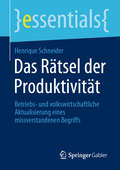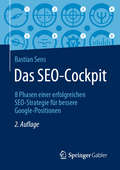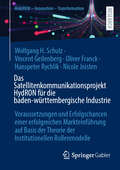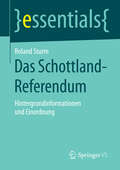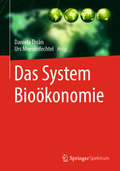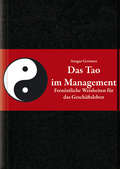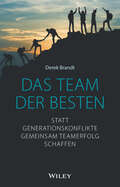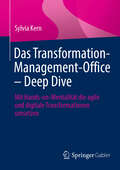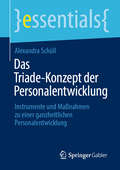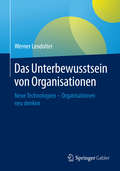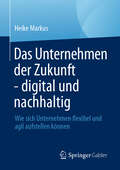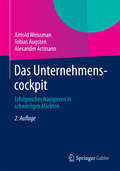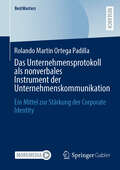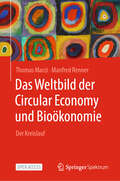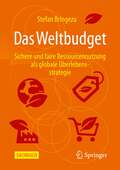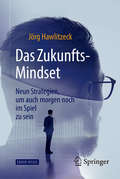- Table View
- List View
Das Richtige digitalisieren: Eine ‚Masterclass‘ zur digitalen Transformation der Wirtschaft
by Markus PertlwieserDieses Buch verschafft Entscheidungsträgern eine sehr fundierte Vorstellung von der strategischen Veränderungskraft der Digitalisierung. Sie verstehendie strategischen Chancen und Notwendigkeiten des digitalen Zeitalters insgesamt und somit auch für ihr Unternehmen bzw. ihren Verantwortungsbereich viel besser. Das Verständnis, dass Digitalisierung die hohe Zeit der Strategie ist, wird geschärft und Neugier für die Gestaltung der Zukunft geweckt. Dank eines Grundverständnis zu den Wirkweisen und -kräften der digitalen Schlüsseltechnologien können die darin liegenden Chancen viel besser erkannt und genutzt werden. Aus den skizzierten Entwicklungen der ausgewählten Ökosysteme können die Leserinnen und Leser die Herausforderungen an die eigene Industrie und das eigene Unternehmens viel besser ableiten. Sie erhalten eine Vielzahl von Impulsen, Anregungen und Beispielen zur Gestaltung der eigenen digitalen Strategie. Und er / sie versteht, welcher Mindset bzw welche neue Einstellung zur Nutzung der Chancen erforderlich ist - bei sich selbst wie auch bei allen Kollegen / innen.
Das Rätsel der Produktivität: Betriebs- und volkswirtschaftliche Aktualisierung eines missverstandenen Begriffs (essentials)
by Henrique SchneiderModerne Dienstleistungsgesellschaften sind wenig produktiv. Das sagen nationale und internationale Gremien immer wieder. Dabei ist die Feststellung ein Rätsel: Wie kann es sein, dass immer mehr in Produktionsmittel investiert wird – Stichwort Digitalisierung – und die Wirtschaft dabei immer weniger produktiv wird? Und paradoxaler noch: Warum steigt die Produktivität in der Krise an? Aus betriebs- und volkswirtschaftlicher Perspektive wird hier auf das Rätsel eingegangen. Dabei sollen der Begriff und die Messung der Produktivität an die Bedürfnisse einer Dienstleistungsgesellschaft angepasst werden.
Das SEO-Cockpit: 8 Phasen einer erfolgreichen SEO-Strategie für bessere Google-Positionen
by Bastian SensIn diesem Buch werden die wesentlichen Erfolgsfaktoren der Suchmaschinenoptimierung erläutert und neben aktuellen Trends auch Handlungsanleitungen zur professionellen Einführung von SEO geliefert. Gespickt mit Beispielen aus der Agenturpraxis zeigt der Autor die acht essenziellen Phasen der Suchmaschinenoptimierung: Positionierung, Zielgruppenbestimmung, Zielsetzung, Kanalauswahl, Contenterstellung und EAT-Aufbau, Conversion- und Usability-Optimierung, technische Optimierung und Controlling. Falls Sie einen Website-Relaunch planen oder für Ihre bestehende Website in Google eine Top-Position erreichen möchten, ist dieses Buch die richtige Grundlage. Es richtet sich an Geschäftsführer von kleinen und mittelständischen Unternehmen sowie Start-ups und an Marketing-Manager sowie Marketingleiter.
Das Satellitenkommunikationsprojekt HydRON für die baden-württembergische Industrie: Voraussetzungen und Erfolgschancen einer erfolgreichen Markteinführung auf Basis der Theorie der Institutionellen Rollenmodelle (Mobilität – Innovation – Transformation)
by Wolfgang H. Schulz Nicole Joisten Vincent Geilenberg Oliver Franck Hanspeter RychlikDie Wettbewerbsfähigkeit der deutschen Volkswirtschaft hängt in besonderem Maße nicht nur von ihrer Innovationskraft ab, sondern auch von der Geschwindigkeit, mit der diese Innovationen zur Marktreife gebracht werden. Dies ist eine entscheidende Voraussetzung, um die ambitionierten Ziele der Digitalen Transformation und der Klimaneutralität (die sog. twin transition) zu erreichen. Hohe Produktivitätssteigerungen, die gleichzeitig neue Wachstumschancen eröffnen, können nur durch kapitalintensive Innovationen realisiert werden. Solche Innovationen erfordern in Deutschland jedoch industrieübergreifende Hyperkooperationen, die diskriminierungsfrei und im Einklang mit wettbewerbsrechtlichen Vorgaben umgesetzt werden müssen. Ein herausragendes Beispiel ist das Projekt HydRON zur laserbasierten Satellitenkommunikation, das als industriepolitisches Vorbild dienen kann. Es zeigt auf, wie durch die Anwendung der Theorie der Institutionellen Rollenmodelle eine Hyperkooperation über verschiedene Industriezweige hinweg erfolgreich gestaltet werden kann.
Das Schottland-Referendum: Hintergrundinformationen und Einordnung (essentials)
by Roland SturmAm 18. September 2014 fand nach einem intensiv geführten Wahlkampf in Schottland ein Referendum statt, das die Gegner einer Trennung vom Vereinigten Königreich deutlicher als erwartet gewannen. Roland Sturm befasst sich mit dem Unabhängigkeitsreferendum, das aufmerksam in jenen europäischen Regionen verfolgt wurde, die nach mehr Autonomie oder staatlicher Unabhängigkeit streben. Schottlands Eigenständigkeit soll nach dem Referendum deutlich gestärkt werden. Damit stellt sich für das Vereinigte Königreich die Verfassungsfrage neu und hinsichtlich der staatsrechtlichen Architektur des Landes sehr grundsätzlich. Die Politik in Schottland hat sich mit dem Referendum grundlegend verändert. Die schottische Unabhängigkeit wurde von einem Randthema zu einem seriösen Thema der schottischen Politik.
Das Scrum-Framework in Großunternehmen – Entscheidung und Implementation: Eine Fallstudie eines multinationalen Automobilkonzerns
by Marcel F. VollandDieses Buch zeigt, wie Managerinnen und Manager das Scrum-Framework optimal in Großunternehmen implementieren können. Es demonstriert einerseits, wie Heuristiken/ Simple Rules Management-Entscheidungen bei der Einführung des Scrum-Frameworks lenken, andererseits wie wesentlich ein Entlernen (intentionales Vergessen) von Regeln ist, um das Scrum-Framework in Großorganisationen anzupassen. Marcel F. Volland formuliert seine Erkenntnisse auf Grundlage einer breit angelegten Fallstudie eines multinationalen Automobilherstellers. Die Besonderheit dieses Falles ist, dass besonders das Mittelmanagement die Verbreitung des agile Framework Scrum im Unternehmen vorangetrieben hat.
Das System Bioökonomie
by Daniela Thrän Urs MoesenfechtelDieses Buch ist eine prägnante Gesamtschau auf den Status Quo der Bioökonomie und ihre zukünftigen Entwicklungen – in Deutschland und darüber hinaus. Zahlreiche Praktikerinnen und Praktiker aus Wirtschaft, Wissenschaft, Zivilgesellschaft und Politik zeigen, wie die Bioökonomie den globalen Problemen der Zukunft begegnet. Auf der Basis nachwachsender Rohstoffe und Energien entwickelt die Bioökonomie neue Produkte und Verfahrensweisen und möchte so eine ökologisch und ökonomisch nachhaltigere Zukunft gestalten. Doch kann ihr das gelingen? Wo liegen ihre Möglichkeiten und Grenzen? Welche Rahmenbedingungen beeinflussen sie? Das Buch beantwortet diese Fragen mit einer systemischen Sicht auf die Bioökonomie und ermöglicht so eine schnelle Orientierung in diesem Thema. Das wird durch zahlreiche Grafiken zusätzlich unterstützt. Somit lädt das Buch dazu ein, die Zukunft der Bioökonomie mitzugestalten.
Das Tao im Management: Fernöstliche Weisheiten für das Geschäftsleben
by Ansgar GerstnerDas Tao Te King ist neben der Bibel das meistveröffentlichte Buch der Welt. Als eine der Quellen des Taoismus schuf Laotse mit diesem Werk zeitloses Wissen von unschätzbarem Wert. Seine Empfehlungen sind bis heute in der chinesischen Medizin, dem militärstrategischen Denken sowie in den Kampfkünsten von großer Bedeutung. Der chinesische Klassiker versteht sich als "Buch des Weges und des Lebens" und führt den Leser zurück zu den Ursprüngen - zu den Dingen, die wirklich glücklich und zufrieden machen. Obwohl schon vor 2500 Jahren verfasst bietet das Tao Te King bis heute lebensweltliches Wissen, das sich zum Vorteil vieler Manager und Führungskräfte auch auf das moderne Geschäftsleben übertragen lässt. Das Tao für Manager lehrt Flexibilität, Anpassungsfähigkeit und Effizienz - Eigenschaften auf die heutzutage kein Manager verzichten kann. Diese Grundsätze des Tao überdauern die Zeit und waren mit Blick auf die Krisenwirren der letzten Jahre und der notwendigen Neuausrichtung von Unternehmen nie so bedeutend für Leben und Arbeit wie heute. Der Taoismusexperte Ansgar Gerstner hat sich seit langen mit der gewinnbringenden Anwendung der Prinzipien taoistischer Philosophie auf das Geschäftsleben beschäftigt und erklärt wie man damit für Erfolg im Unternehmen sorgt. Denn es zeigt vor allem wie man einen großen Organismus, wie beispielsweise ein Unternehmen über lange Zeit krisenfest und gesund halten kann.
Das Team der Besten: Statt Generationskonflikte gemeinsam Teamerfolg schaffen
by Derek BrandtDas Buch von Derek Brandt zeigt anhand von Geschichten und konkreten Tipps aus der umfangreichen Berufspraxis des Autors auf, wie eine positive Arbeitsatmosphäre und eine authentische Führung zur Transformation von Unternehmen beitragen können. Mithilfe von Analysen und Erfahrungsberichten erläutert der Autor einen neuen Weg - weg von hierarchischen Strukturen hin zu teamorientierter Führung und selbstbestimmten Mitarbeitenden, um eine neue Dynamik in der Organisation zu schaffen. Gerade die nachrückenden jüngeren Generationen bzw. die Berufseinsteiger erwarten etwas anderes als die Babyboomer. Sie fordern mehr Selbstbestimmung. Darauf muss in der Teamführung und Zusammenarbeit eingegangen werden. Der Autor ermuntert deshalb dazu, althergebrachte Sichtweisen nicht nur zu hinterfragen, sondern komplett zu verwerfen. Stattdessen bietet er eine Anleitung, wie Führung heute besser gelingen kann. Dieses Buch ist ein Muss für jeden, der verstehen möchte, wie man als Organisation und in Teams in einer sich ständig verändernden Welt agil reagieren und einen nachhaltigen Erfolg erzielen kann. Durch die Umsetzung der im Buch vorgestellten Strategien können die Leser die Zufriedenheit und Bindung ihrer Mitarbeitenden erhöhen, was zu einer höheren Produktivität führt. Abgesehen von beruflichen Vorteilen, fördert das Buch auch persönliches Wachstum und Selbstvertrauen, indem es die Bedeutung von Selbstbestimmung und Eigenverantwortung betont. Außerdem bietet es auch Tools und Techniken zur effektiven Bewältigung und Lösung von Konflikten am Arbeitsplatz. Dies kann dazu beitragen, das allgemeine Arbeitsklima zu verbessern und die Teamarbeit zu stärken. Derek Brandt liefert damit einen Leitfaden, der ein Aufruf zum Handeln, eine Aufforderung zur Veränderung und eine Vision für eine bessere Zukunft ist.
Das Telenotarztsystem als Innovation der präklinischen Notfallversorgung: Eine ökonomische Analyse am Beispiel des Landkreises Vorpommern-Greifswald (Gesundheitsmanagement und Gesundheitsökonomik)
by Rebekka SüssDas Telenotarztsystem gewinnt seit Jahren stetig an Bedeutung in der präklinischen Notfallrettung und wurde bereits in unterschiedlichen Pilotprojekten deutschlandweit getestet. In dem Band wird das System, wie es im Landkreis Vorpommern-Greifswald mit dem Projekt Land|Rettung eingeführt wurde, kritisch betrachtet. Dafür wurden Einsatzdaten der Notfallrettung aus den Jahren 2015 bis 2020 in einem Prä-Post-Vergleich umfassend analysiert und zusätzlich die Kosten des Systems anhand der Projektumsetzung dargestellt. Zusätzlich wurden durch die Modellierung eines Warteschlangensystems die Gestaltungsmöglichkeiten (zentrale vs. dezentrale Koordination) des Telenotarztsystems und deren Vor- und Nachteile untersucht.
Das Transfermanagement von Hochschulen: Eine empirische Untersuchung
by Linda GranowskeLinda Granowske analysiert in diesem Buch empirisch das Transfermanagement von Hochschulen und untersucht, wie diese die zunehmenden Anforderungen im Spannungsfeld zwischen Wissenschaft und Gesellschaft organisieren und bewältigen. Durch eine umfassende, prozessorientierte Untersuchung werden die Steuerung und Optimierung von Austauschbeziehungen zwischen Hochschulen und ihrer Umwelt analysiert. Der interdisziplinäre Forschungsansatz kombiniert verwaltungswissenschaftliche, betriebswirtschaftliche und organisationstheoretische Perspektiven, um zentrale Akteure und Managementinstrumente systematisch zu erfassen. Im Ergebnis werden innovative Ansätze für das Transfermanagement entwickelt, die sowohl theoretisch fundiert als auch praktisch umsetzbar sind.
Das Transformation-Management-Office – Deep Dive: Mit Hands-on-Mentalität die agile und digitale Transformationen umsetzen
by Sylvia KernUnternehmen und Organisationen, ganz gleich welcher Größe, müssen sich den veränderten Rahmenbedingungen wie der Digitalisierung anpassen und sich verändern, um wettbewerbsfähig zu bleiben. Für solche tiefgreifenden Umstrukturierungsprozesse braucht es eine zentrale Steuerstelle im Unternehmen – das Transformation-Management-Office (kurz: TMO). Mit den erforderlichen Ressourcen und passenden Game-Changern ausgestattet, fungiert das TMO als kompetenter Verfechter des Wandels. Im zweiten Band der Reihe, dem Deep Dive, wird die Herausforderung der agilen und digitalen Transformation detailliert erläutert. Sie finden unter anderem Deep-Dive-Know-how und eine entsprechende Vorgehensweise anhand eines Leuchtturmprojektes. Das kompetente TMO-Team setzt die strategischen Pläne in die Praxis um: Kick-off-Veranstaltungen werden initiiert, die Future Landscape visualisiert und die Weichen für einen umfassenden Wandel im Unternehmen gestellt. Das Buch begleitet zudem die Einführung eines ERP-Systems (Enterprise-Resource-Planning); die Autorin stellt die dafür wichtigsten Erfolgsfaktoren sowie zahlreiche hilfreiche Methoden und Templates vor. Ein Beitrag von Iris Zeppezauer sowie ein Interview mit Gerda Söhngen und Christian Schmidt geben Impulse aus der Praxis für die Praxis.
Das Transformation-Management-Office – Die Basis: Grundlagen und Rüstzeug für agile und digitale Transformationen
by Sylvia KernMehr denn je und agiler denn je müssen sich Unternehmen, ganz gleich welcher Größe, den veränderten Rahmenbedingungen wie der Digitalisierung anpassen und sich verändern, um wettbewerbsfähig zu bleiben. Für solche tiefgreifenden Umstrukturierungsprozesse braucht es eine zentrale Steuerstelle im Unternehmen – das Transformation-Management-Office (kurz: TMO). Mit den erforderlichen Ressourcen und passenden Game-Changern ausgestattet, fungiert das TMO als kompetenter Verfechter des Wandels. Das Transformation-Management-Office richtet alle Initiativen und Projekte auf die Vision, den Auftrag und die Ziele eines Unternehmens aus und stellt sicher, dass echte Geschäftsbedürfnisse erkannt und berücksichtigt werden. Gemeinsam wird ein Transformationsfahrplan entwickelt, der alle Bereiche der Organisation zu einem einheitlichen System für die Umsetzung von Strategien durch Projekte verbindet.Vor jedem Neuanfang muss erst einmal eine Bestandsaufnahme erfolgen: Welches Ziel wollen wir erreichen, was und wen brauchen wir dafür und wie sehen die Rahmenbedingungen aus? Dieses Fachbuch stellt die grundlegende Basis und das notwendige Rüstzeug vor, welche es braucht, um die agile und digitale Transformation strukturiert und etappenweise erfolgreich zu implementieren. Zahlreiche Expertentipps, Best Practice und anschauliche Vorlagen unterstützen Sie dabei – damit Sie sicher und erfolgreich Ihren Transformationsweg gehen können!Das TMOrichtet alle Initiativen und Projekte auf die Vision, den Auftrag und die Ziele eines Unternehmens ausentwickelt gemeinsam mit Führungskräften und PMO einen Transformationsfahrplangewährleistet die volle Verantwortlichkeit und Konformität mit den Prioritäten, Plänen und Strategien der Transformationentlastet die Unternehmensführung effektiv und proaktiv unterstützt die Teams dabei, voneinander zu lernen, unproduktive Redundanzen zu vermeiden und Widerstände zu überwinden
Das Triade-Konzept der Personalentwicklung: Instrumente und Maßnahmen zu einer ganzheitlichen Personalentwicklung (essentials)
by Alexandra SchüllAusgehend von der Beschreibung des gegenwärtigen, desolaten Zustandes der Personalentwicklung wird in diesem essential eine Konzeption der triadischen Beziehungen (Triade-Konzept) entwickelt, das die wesentlichen Gestaltungselemente und Einflussfaktoren erläutert und die kausalen Wechselbeziehungen und interaktiven Zusammenhänge aufzeigt. Es wird deutlich gemacht, dass nur durch eine ganzheitliche Personalentwicklung die Herausforderungen durch Industrie 4.0 und Arbeitswelt 4.0 zu bewältigen sind.
Das Unterbewusstsein von Organisationen: Neue Technologien - Organisationen neu denken
by Werner LeodolterAusgehend von Analogiebetrachtungen zur Funktionsweise des Gehirns aus physiologischer und verhaltenspsychologischer Sicht wird beschrieben, wie Organisationen agiler und zukunftsfähiger gestaltet werden können. Technologische Entwicklungen wie Big Data, Social Media, Augmented Reality, Internet der Dinge und künstliche Intelligenz können von einer Organisation nur erfolgreich genutzt werden, wenn sie im ,,Unterbewusstsein der Organisation" und damit deren Infrastruktur gezielt eingebaut werden, den handelnden Menschen intuitiv zugänglich und nutzbar gemacht werden und so das zweckmäßige Handeln und Entscheiden in der Organisation unterstützen. Dieser neue Denkansatz - das Modell des Unterbewusstseins von Organisationen und die Gestaltungsmöglichkeiten - wird praxisorientiert anhand von Beispielen und Szenarien erläutert. Das Buch richtet sich an innovative Führungskräfte, Strategen, Organisatoren und Berater, die bereit sind, ihre Organisationen ,,neu zu denken", sowie an Leser mit Interesse an Wirtschaft, Technologie und Gesellschaft.
Das Unternehmen der Zukunft - digital und nachhaltig: Wie sich Unternehmen flexibel und agil aufstellen können
by Heike MarkusDieses Buch liefert konkrete Ansätze, wie sich Unternehmen mittels der Digitalisierung flexibel und agil aufstellen können, um langfristig erfolgreich zu sein. Das nahtlose Zusammenspiel aller Dimensionen einer Organisation (Strategie, Steuerung, Prozesse, Daten, Technologie, Personal und Führung) ist entscheidend, wenn Unternehmen einen echten Mehrwert aus der Digitalisierung generieren wollen. Nur so lässt sich die wachsende Komplexität der Märkte beherrschen. Die Autorin und die Gastautoren geben anhand von Praxisberichten und -beispielen konkrete Handlungsempfehlungen. Das Buch wendet sich an Unternehmen jeder Größe und ist international ausgerichtet – mit einem Fokus auf den Vergleich zwischen Deutschland und Indien. Es liefert neue Denkansätze, um ausgetretene Pfade zu verlassen und in eine erfolgreiche, digitale und nachhaltige Zukunft zu blicken. Aus dem Inhalt Auf dem Weg zum digitalen und nachhaltigen Unternehmen Strategieentwicklung und integrierte Steuerung als Basis Organisation und Führung in strategische Ansätze einbinden Integrierte Prozesse als Erfolgsfaktor Daten als Asset verstehen, um international erfolgreich zu sein Der Mehrwert neuer Technologien steckt in deren Integration Qualifizierung des Personals als wichtiger Schlüssel der Digitalisierung Mit Gastbeiträgen von Thomas Meuche, Shantall Cisneros Saldana, Ravi Prakash und Shantanu Jadhav.
Das Unternehmenscockpit: Erfolgreiches Navigieren in schwierigen Märkten
by Alexander Artmann Tobias Augsten Arnold WeissmanWie es der Unternehmensleitung gelingt, ihre Navigationsinstrumente anzupassen, die Steuerungsqualität zu verbessern und Instrumente zur Krisenprävention einzuführen, zeigt dieses Buch. Es ist von Praktikern für Praktiker geschrieben und schöpft aus einem soliden Erfahrungsschatz konkreter Unternehmensprojekte.
Das Unternehmensprotokoll als nonverbales Instrument der Unternehmenskommunikation: Ein Mittel zur Stärkung der Corporate Identity (BestMasters)
by Rolando Martin Ortega PadillaIn diesem Buch wird das Unternehmensprotokoll als Bestandteil der Corporate Communication zur Stärkung der Corporate Identity untersucht. Dabei wird das Protokoll als nonverbales Instrument betrachtet, das durch qualitative Forschung, insbesondere Experteninterviews und Inhaltsanalyse, untersucht wurde. Die Ergebnisse zeigen, dass das Unternehmensprotokoll auf Ordnungs- und Hierarchieprinzipien basiert und den Umgang zwischen Unternehmensleitung und Schlüsselstakeholdern regelt, wodurch es ein positives Corporate Image fördert. Das Unternehmensprotokoll erweist sich somit als strategisches und operatives Mittel zur Außendarstellung, welches zur Festigung von Beziehungen beiträgt. Es schafft Rahmenbedingungen, die den Kommunikationsprozess beeinflussen und dabei helfen, die Unternehmensziele sichtbar zu machen. Besonders im Bereich der nonverbalen Kommunikation zeigt sich seine Fähigkeit, durch Raum und Zeit die interpersonale Kommunikation auf der höchsten Beziehungs-, Verhandlungs- und Repräsentationsebene zu prägen.
Das Verbot des Rückkaufhandels gemäß § 34 Abs. 4 GewO: Auswirkungen auf „Sale-and-rent-back“-Verträge
by Philip RaillonDas Rückkaufhandelsverbot gemäß § 34 Abs. 4 GewO ist zuletzt vermehrt in den Fokus der Gerichte geraten. Das hängt mit Klagen von Verbrauchern zusammen, die bei Liquiditätsengpässen entsprechende Geschäftsmodelle beanspruchten und sich benachteiligt fühlten. Oft handelt es sich um sogenannte „Sale-and-rent-back“-Verträge. Philip Raillon beleuchtet das Verhältnis des Rückkaufhandelsverbots zum Pfandleih- und Kreditwesen. Er ordnet die Verbotsnorm verwaltungs-, zivil-, verfassungs- sowie europarechtlich ein. Der Autor setzt sich kritisch mit bisherigen Urteilen auseinander und entwickelt eine von der BGH-Ansicht abweichende Normanwendung. Anhand dieser überprüft er konkrete Praxisbeispiele. Im Ergebnis stellt der Verfasser einen unzureichenden Verbraucherschutz fest. Er entwickelt einen Reformvorschlag, mit dem Lücken im Schutzgehalt geschlossen würden.
Das Verkaufsnavi für Medienberater: Der Fahrplan zu mehr Umsatz im Verkauf von Werbemitteln
by Ricky McKennaDieses Buch zeigt Medienverkäufern anhand einer strukturierten Schritt-für-Schritt-Anleitung den optimalen Verkaufsprozess auf: Mittels eines Verkaufsnavigators begleitet es Verkäufer aus dem Medienbusiness durch unterschiedliche Straßen und führt sie vom Start – der Suche nach geeigneten Kundenpotenzialen – zum Ziel: dem Verkaufsabschluss.Der Autor zeigt alle Baustellen und Umleitungen wie zum Beispiel Einwände oder taktische Preisverhandlungen auf, aber auch Abkürzungen, wie das Erkennen von frühzeitigen Kaufsignalen. Denn der Verkaufsprozess folgt immer einer klaren Struktur, und diese zu kennen, die jeweils passenden Techniken zu üben und immer wieder anzuwenden, kann zu spürbar mehr Umsatz führen.Ein kompaktes und unkompliziert lesbares Buch, gespickt mit persönlichen Erfahrungsberichten von Verkaufs- und Medienprofi Ricky McKenna, mit dessen Tipps Sie hochgesteckte Umsatzziele auch in wirtschaftlich schwierigen Zeiten erreichen.
Das Weltbild der Circular Economy und Bioökonomie: Der Kreislauf
by Thomas Marzi Manfred RennerDies ist ein Open-Access-Buch. In der Natur, heißt es, befindet sich alles im Kreislauf. Für die Circular Economy und Bioökonomie ist die Kreislauffigur deshalb „das“ Leitmotiv. Ein Teil ihrer Denkschulen orientiert sich an der Natur und will deren Kreisläufe nachahmen. So bedeutend der Kreislaufbegriff für sie aber auch ist, in den zugehörigen Fachgemeinschaften fehlt es bisher an einer Auseinandersetzung damit. Diese Lücke soll das Buch schließen. Es befasst sich damit, was Kreisläufe sind, betrachtet die historische Entwicklung des Denkens in Kreisläufen, unterscheidet verschiedene Kreislaufmodelle und fragt danach, ob die eingangs getroffene Aussage, dass die Natur in Kreisläufen arbeitet, tatsächlich zutrifft. Abschließend erfolgt ein wichtiger Vergleich: Ist das, was mit Blick auf die Natur als Kreislauf bezeichnet wird, dasselbe, wie das, was in der Circular Economy und Bioökonomie so genannt wird?
Das Weltbild der Circular Economy und Bioökonomie: Vorbild Natur?
by Thomas Marzi Manfred RennerDies ist ein Open-Access-Buch. Bei der Suche nach neuen Wirtschaftsformen richten sich viele Hoffnungen auf die Circular Economy und Bioökonomie. Beiden wird das Potenzial zugesprochen, die Natur mit ihren Ressourcen zu schützen und gleichzeitig wirtschaftliches Wachstum zu ermöglichen. Welche Vorstellungen aber wirken in ihrem Hintergrund? Bei beiden Konzepten spielen die „Kreisläufe der Natur“ eine wesentliche Rolle. In manchen Denkschulen der Circular Economy sind sie ein Vorbild, nach dem Wirtschaftsprozesse gestaltet werden sollen. In der Bioökonomie sind sie „die“ Grundlage des Wirtschaftens. Dieses „Weltbild der Circular Economy und Bioökonomie“ ist Thema des vorliegenden Buches.
Das Weltbudget: Sichere und faire Ressourcennutzung als globale Überlebensstrategie
by Stefan BringezuDieses Buch beschreibt die zukunftsfähige Gestaltung der physischen Basis von Wirtschaft und Gesellschaft insgesamt durch eine gerechte Steuerung des weltweiten Ressourcenverbrauchs.Es erläutert Strategien, die die Entwicklung von Gesellschaften und Individuen auch bei begrenztem Güterverbrauch ermöglichen und gleichzeitig dem universellen Bedürfnis des Menschen nach Sicherheit und Unabhängigkeit entgegenkommen. Die Idee eines Weltbudgets der globalen Ressourcennutzung kann als wichtige Referenz für das Management auf der internationalen, nationalen und lokalen Ebene dienen und den Verbrauch weltweit auf eine sichere und faire Basis stellen. So lassen sich wirksame Hebel gezielt dort ansetzen, wo der Verbrauch wesentlich bestimmt wird: bei Art und Umfang von Produktion und Konsum sowie der Gestaltung der Infrastrukturen.Als Zielorientierung und Referenz dienen konkrete Obergrenzen für die Nutzung globaler Ressourcen, um ein gutes Leben für alle auf diesem Planeten zu sichern.
Das Wissen des Aufsichtsrats
by Richard HeinrichsGegenstand dieses Buches ist die Zurechnung des Wissens der Aufsichtsratsmitglieder einer deutschen AG. Hierbei handelt es sich um eine für die Praxis äußerst aktuelle Problematik, die dem komplexen und in der Rechtswissenschaft hoch umstrittenen Gebiet der Wissenszurechnung bei juristischen Personen angehört. Da die Thematik rund um das Wissen des Aufsichtsrats nicht ohne ein Grundverständnis der Wissenszurechnung im Ganzen analysiert werden kann, arbeitet der Autor zunächst die Entwicklungen dieses Rechtsinstituts auf und geht dabei insbesondere auf ungeklärte Aspekte ein, die an späterer Stelle für den Aufsichtsrat von Bedeutung sind. Hierauf folgt eine Untersuchung aller rechtlichen und tatsächlichen Entwicklungen des Aufsichtsorgans in den letzten Jahrzehnten, die für die Wissenszurechnung relevant sind und deren Berücksichtigung in der Literatur bislang ausblieb. Das auf dieser Grundlage vom Autor entwickelte Lösungsmodell bietet der Praxis ein eingängiges Instrument, welches nicht nur auf das Wissen des Aufsichtsrats anwendbar ist, sondern nahezu alle denkbaren Konstellationen der zivilrechtlichen Wissenszurechnung einbezieht.
Das Zukunfts-Mindset
by Jörg Hawlitzeck Hermann SchererWelche Fähigkeiten brauchen wir, um mit dem durch Digitalisierung und technischen Fortschritt immer schnelleren Entwicklungstempo Schritt zu halten? Welche Eigenschaften und Verhaltensweisen garantieren, dass wir nicht überrollt oder gar überflüssig werden? Wenn Sie diese Fragen beschäftigen, so hat der erfolgreiche Leadership-Experte, Coach und Keynote-Speaker Jörg Hawlitzeck eine gute Nachricht für Sie: Alles, was Sie für Ihre Zukunft brauchen, liegt bereits in Ihnen. Mit dem richtigen Mindset gehen Sie neuen Entwicklungen mutig entgegen, anstatt ihnen hinterherzulaufen. Sie erfahren in diesem Buch, wie jeder Einzelne und unsere Unternehmen aufgestellt sein müssen, um für eine ebenso spannende wie unsichere Zukunft gerüstet zu sein. Anhand vieler praktischer Beispiele, Erfahrungen aus erster Hand und Interviews mit Entscheidungsträgern vielversprechender Unternehmen zeigt der Autor, worum es im Kern geht: Um eine zupackende, optimistische und offene Haltung, die in Tatkraft und Veränderungsbereitschaft mündet – kurz: um das richtige Mindset.„Die Entscheidung, sich vom Zukunfts-Mindset inspirieren zu lassen ist eine Chance, die Sie sich keinesfalls entgehen lassen sollten.“ Hermann Scherer

